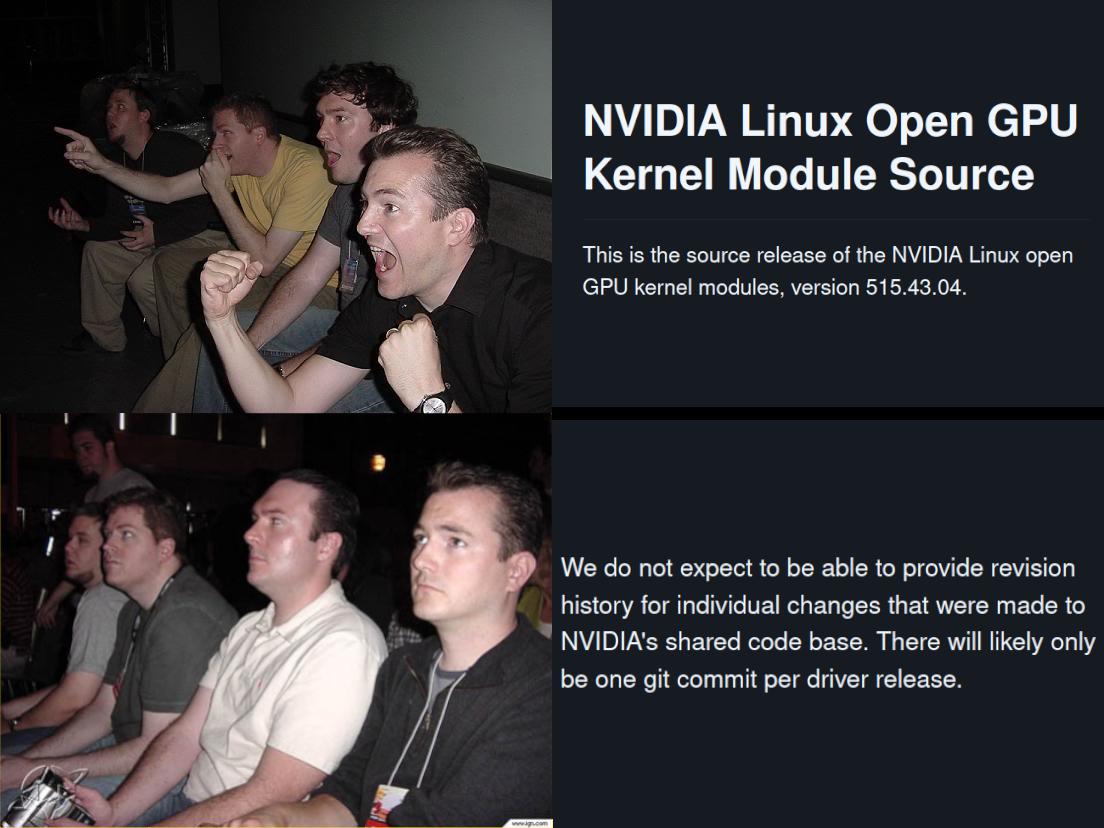this post was submitted on 30 Jul 2023
595 points (98.4% liked)
linuxmemes
21173 readers
151 users here now
Hint: :q!
Sister communities:
- LemmyMemes: Memes
- LemmyShitpost: Anything and everything goes.
- RISA: Star Trek memes and shitposts
Community rules (click to expand)
1. Follow the site-wide rules
- Instance-wide TOS: https://legal.lemmy.world/tos/
- Lemmy code of conduct: https://join-lemmy.org/docs/code_of_conduct.html
2. Be civil
- Understand the difference between a joke and an insult.
- Do not harrass or attack members of the community for any reason.
- Leave remarks of "peasantry" to the PCMR community. If you dislike an OS/service/application, attack the thing you dislike, not the individuals who use it. Some people may not have a choice.
- Bigotry will not be tolerated.
- These rules are somewhat loosened when the subject is a public figure. Still, do not attack their person or incite harrassment.
3. Post Linux-related content
- Including Unix and BSD.
- Non-Linux content is acceptable as long as it makes a reference to Linux. For example, the poorly made mockery of
sudoin Windows. - No porn. Even if you watch it on a Linux machine.
4. No recent reposts
- Everybody uses Arch btw, can't quit Vim, and wants to interject for a moment. You can stop now.
Please report posts and comments that break these rules!
founded 1 year ago
MODERATORS
you are viewing a single comment's thread
view the rest of the comments
view the rest of the comments

They don't care about free software in the same way that many others in the FOSS community do. They don't believe all information should be free, or copyleft, but they will contribute significantly to an ecosystem if it results in software that is cheaper for them because they can spread the cost of maintenance and enhancement, and is not subject to exploitative contracts from vendor lock in.
A lot of the infrastructure I use at work is open source, some of it, like Chrome, is open source because the primary contributing company wants to use it to exert influence over the ecosystem, but other software, like PostGres, is maintained by a bunch of different for- and non-profit institutions because they hate oracle and want to make a cheaper to maintain relational database or sell services to companies using said cheaper relational database, but the latter is definitely kept in check by the former.
Businesses don't care about ideologies in general. They care about money.
They will use and contribute to FOSS whenever it fits their cost-benefit analysis.
That means, they usually don't mind FOSS for stuff that they don't sell, but that is used as infrastructure for their products.
For example, nobody makes money selling a kernel, but a kernel is a necessary base for many different products. If, for example, I build a car entertainment system, people buy a car entertainment system. Being able to use Linux as a base saves a huge amount of development cost. So a company might use Linux here and maybe even contribute some code. Because they benefit from cooperation on infrastructure that they don't directly make money off.
But of course they aren't in it for the ideology, so once using/contributing to FOSS would hurt their earnings, they will stop doing that.
It feels like we're saying the same thing at different levels of skepticism. Their primary motivation is going to be money as they're private companies. Most people will stop contributing to an open source project when it stops being important to them. Either its not profitable for them, or its no longer cutting edge, or they just don't like the direction of the project.
My main point is that private companies can and do contribute to the FOSS ecosystem and can do so in helpful, non-nefarious ways. Most aren't google, most just want a useful and reliable message queue or database or kernel without trying to profit directly from the component itself and instead just using the component to do the thing that actually makes them profitable.
Yeah, that's exactly what I meant.
In my company, for example, we are encouraged to contribute bugfixes/features that we need to FOSS projects that we use. E.g. we find a bug in Angular, we are encouraged to fix it and send it upstream.
But we are forbidden from making anything open source that we'd want to sell.
But you are also right that also private people have their limits when they contribute to a FOSS project, as evidenced by the many, many forks of FOSS software when the original project changes in a way the contributors didn't like (looking at you, OpenOffice. Or at any Debian-like OS)
Depending on the industry (thinking engineering and safety in particular) FOSS may actually cost more to implement and certify so that also has a bearing. But yeah, ultimately all about cost + revenue.
That is true, but on the other hand, industries like that usually don't use FOSS.